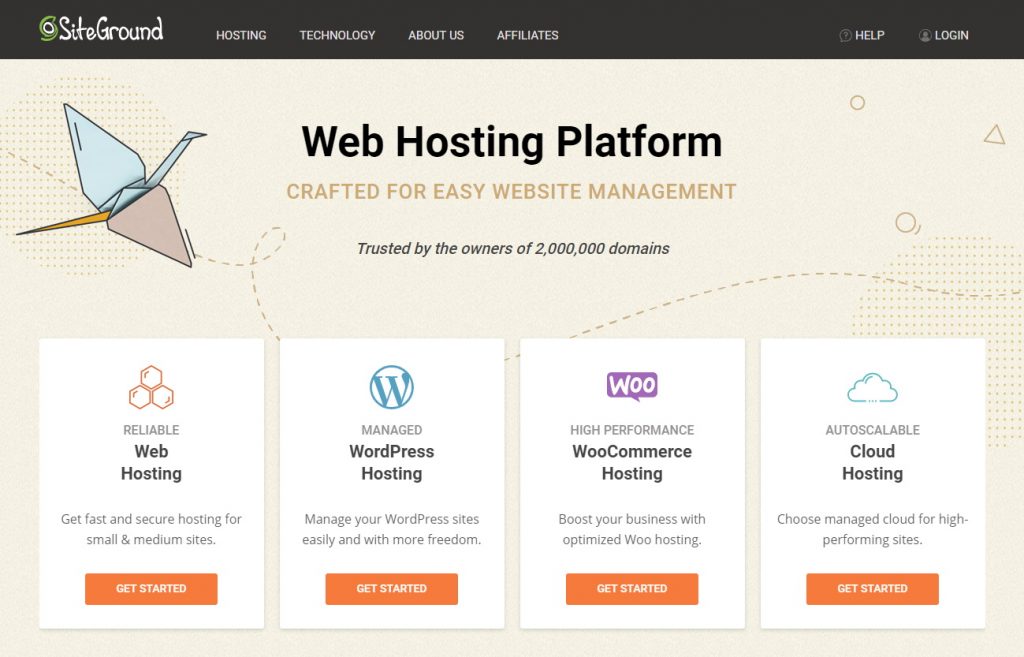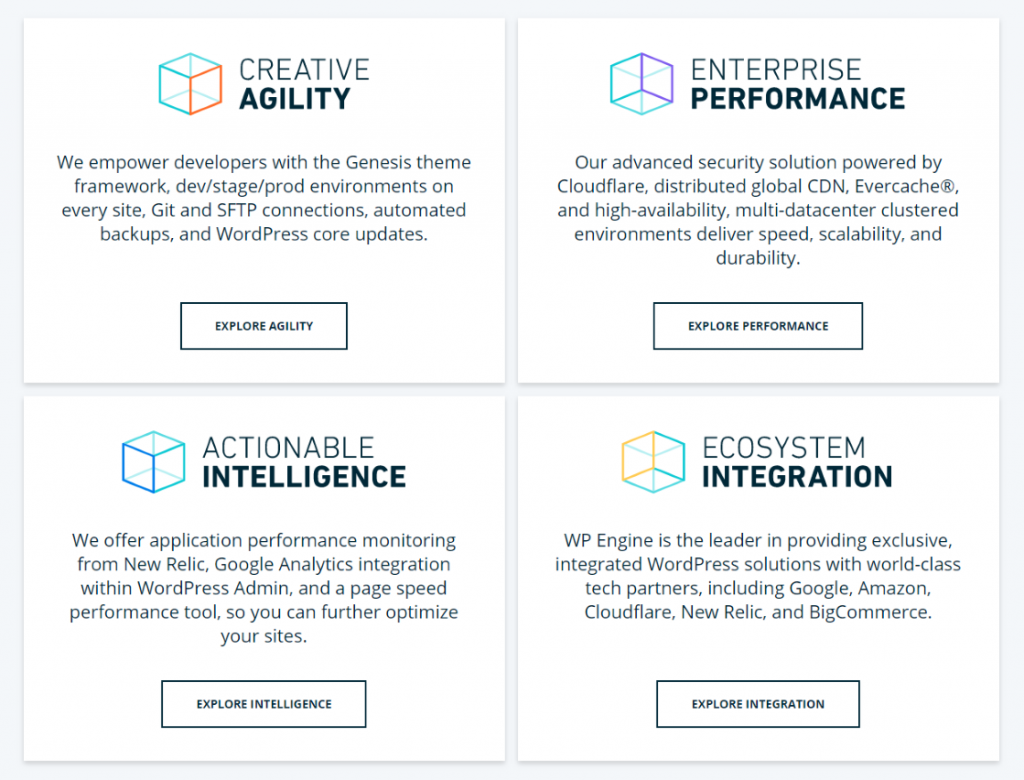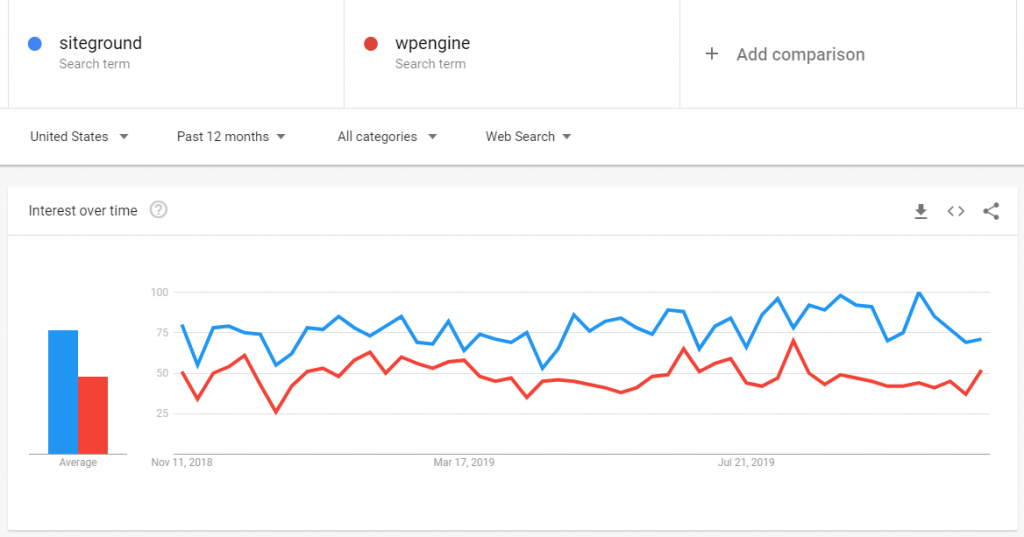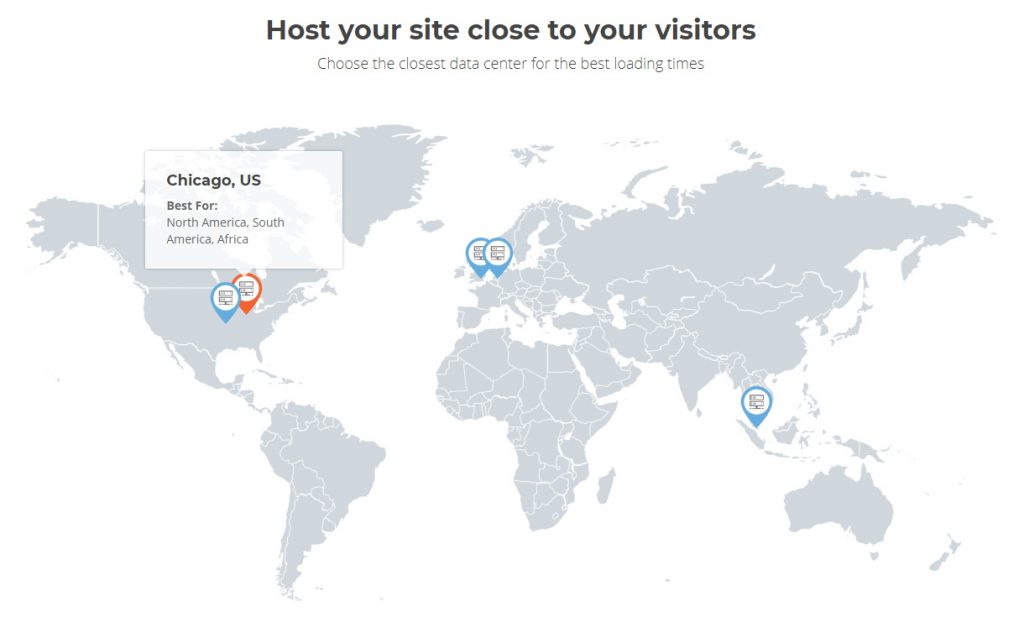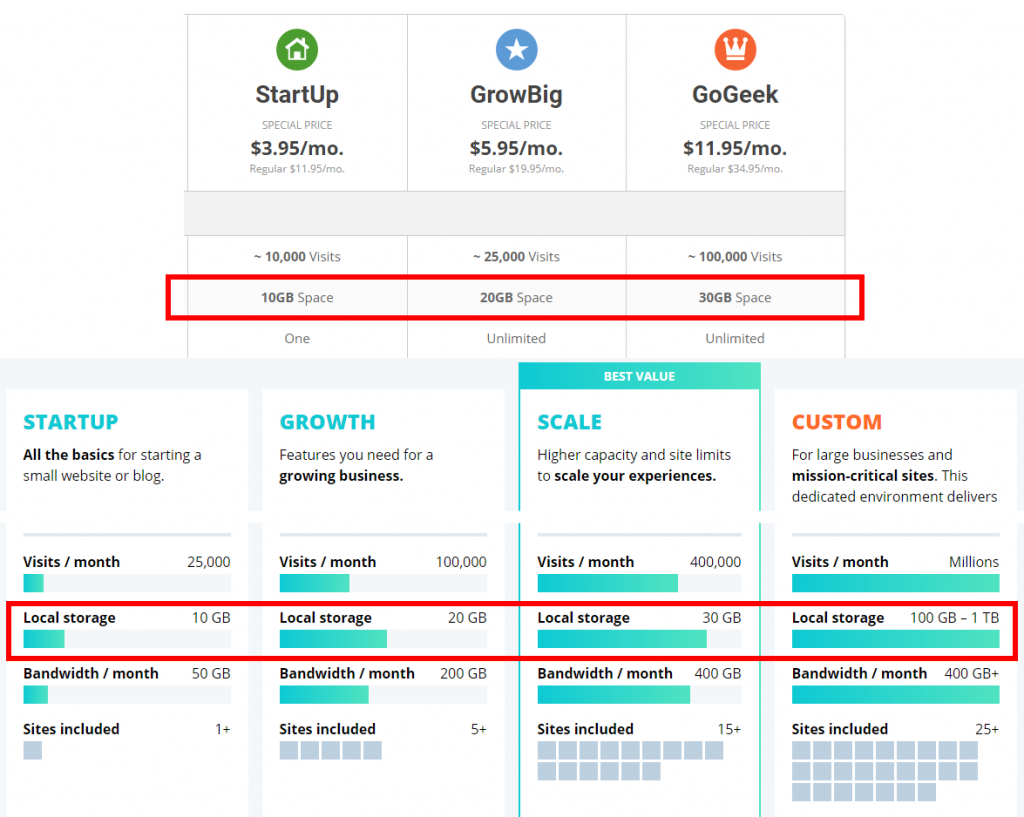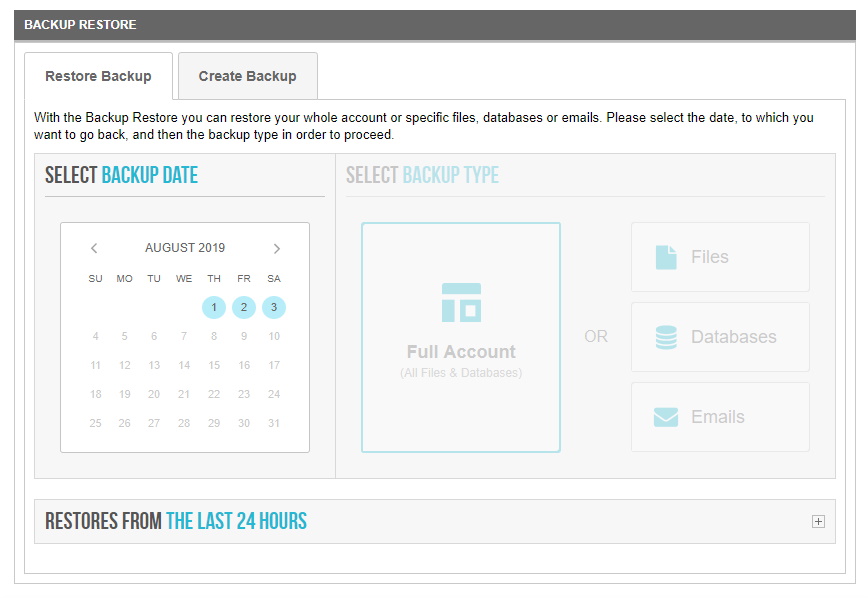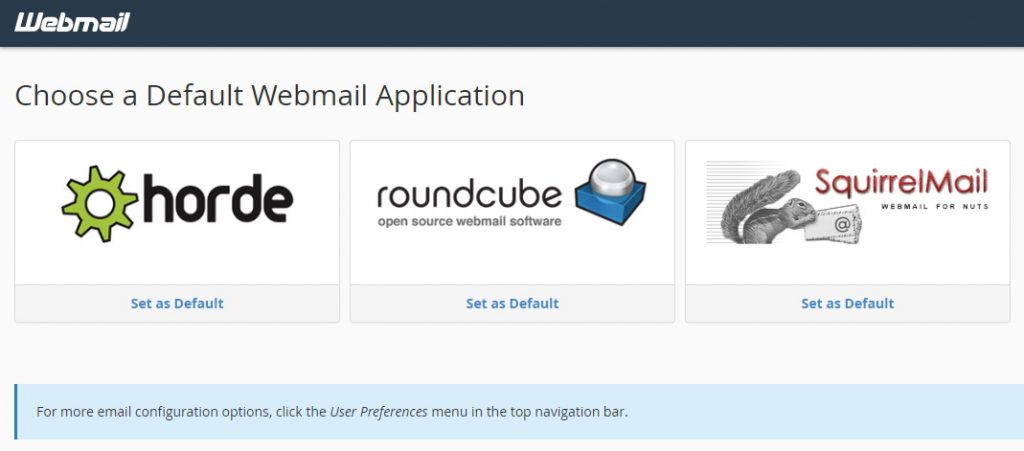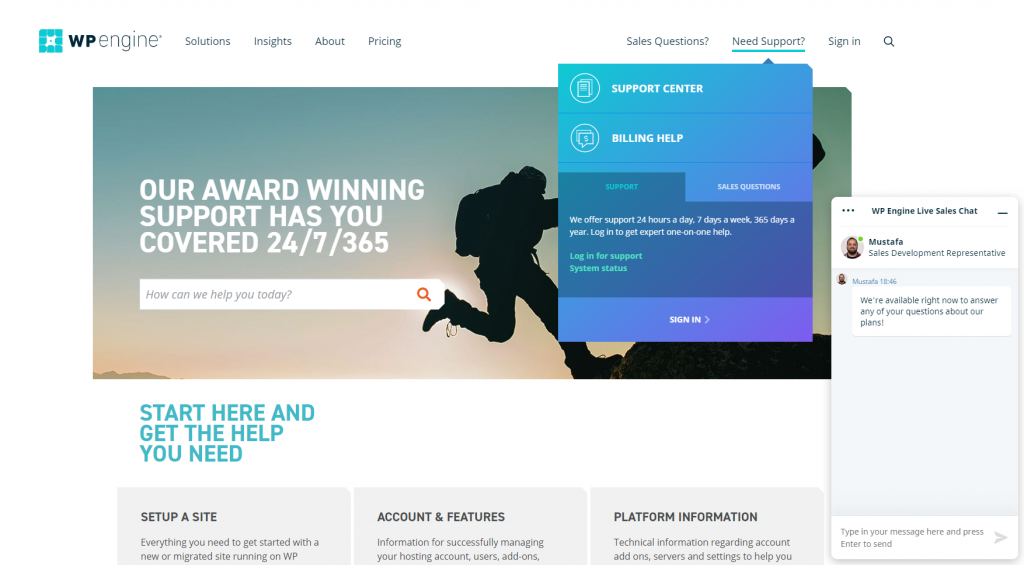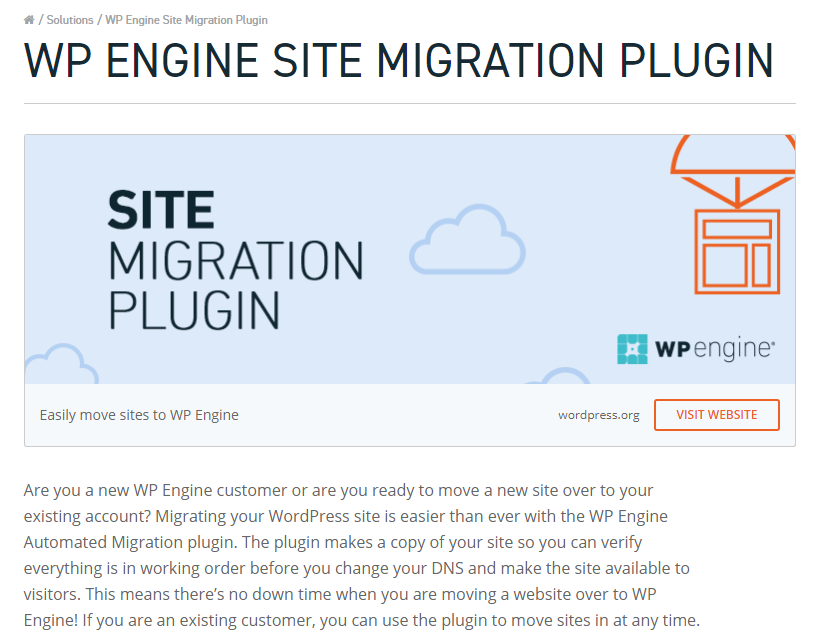SiteGround and WP Engine are both established web hosting companies, but their scopes are a bit different.
SiteGround offers many different types of hosting including standard hosting, WooCommerce hosting, and managed WordPress hosting. WP Engine specializes in managed WordPress hosting only, hence its name.
But which host is better? In this SiteGround vs. WP Engine article, I’m going to focus on their managed WordPress hosting solutions and compare them in all of the important metrics, including speed, uptime, and customer support.
I will say that based on my extensive analysis and tests, both web hosts have advantages and are ideal for certain types of webmasters.
Note that these tests and comparisons were made on the shared hosting plans, and I can’t make any definitive conclusions on dedicated hosting. However, it’s fairly safe to extend many of the conclusions of this comparison to other types of hosting.
The handy table below will give you a quick overview of the conclusions of my comparison. Click the entries on the left column to be taken to their corresponding sections.
| SiteGround | WP Engine | Winner | |
| Popularity | More popular | Less popular | SiteGround |
| Technologies | Excellent | Excellent | Tie |
| Features | Excellent | Limitations | SiteGround |
| Speed | Excellent | Excellent | WP Engine |
| Uptime | Excellent | Excellent | Tie |
| Support | Excellent | Excellent | Tie |
| Site Transfer | First is free | Migration plugin | Tie |
| Security | Great | Great | Tie |
| Prices | Cheaper | Expensive | SiteGround |
What solutions do they offer?
Now I’ll go over the various hosting solutions that both web hosts offer. I’ll compare price and storage later in the review.
SiteGround
SiteGround offers shared hosting plans under three types: web hosting, WordPress hosting, and WooCommerce hosting.
Each of these hosting types has three plan levels: StartUp, GrowBig, and GoGeek. StartUp allows for one domain and has the least amount of storage space, while GrowBig and GoGeek allow for unlimited domains, have more storage space, and offer additional features.
SiteGround also offers cloud hosting (hosting in the cloud with dedicated resources), dedicated servers, and enterprise hosting (custom infrastructure).
WP Engine
WP Engine offers managed WordPress hosting for small & medium businesses, enterprises and agencies.
There are four tiers of plans: Startup, Growth, Scale, and Custom. Here are their key features:
| Startup | Growth | Scale | Custom | |
| Max sites | 1 | 5 | 15 | 25+ |
| Storage | 10 GB | 20 GB | 30 GB | 100 GB – 1 TB |
| Bandwidth | 50 GB/mo | 200 GB/mo | 400 GB/mo | 400+ GB/mo |
| Other | No phone | 24/7 phone | Imported SSL | Advanced features |
Custom enterprise plans include features like geotargeting, WordPress multisite, consultative onboarding, and launch readiness assessments.
WP Engine also supports developers with integrated DevKits, the Genesis Framework, CDN setup, a Performance Intelligence Suite, and much more.
Popularity
It turns out that SiteGround is quite a bit more popular than WP Engine; this contrasts with other web host comparisons I’ve done in the past involving SiteGround.
However, it’s not surprising considering WP Engine only offers managed WP hosting and is more of a niche service. Check out the following Google Trends graph:
As you can see, SiteGround is consistently above WP Engine by about 25-40 interest points. An interesting thing to note is that if you include a space in the term “WP Engine”, their trend levels drop even further.
In addition, SiteGround claims to host over 2,000,000 domains, while WP Engine hosts over 500,000. Having said that, a smaller customer base says little to nothing about the quality of the web host.
Winner: SiteGround
Technologies
SiteGround has an entire section on their website dedicated to the technologies they use. They divide them into 3 categories: data centers, speed, and uptime.
WP Engine also has pretty thorough documentation on the technologies they use for their WordPress hosting in their Help Center.
Here’s a summary of what is available:
| Technology | SiteGround | WP Engine |
| Data Centers | Five in 3 continents | Ten in 3 continents |
| Solid-State Storage | Yes | Yes |
| NGINX | Yes | Yes |
| CDN | Yes | Yes |
| HTTP/2 | Yes | Yes |
| PHP 7 | Yes | Yes |
Let’s start with data centers.
Data Centers
The speed and stability of your website depend a lot on the location and characteristics of the closest data center. This is why it’s important to have multiple high-quality data centers in different locations, preferably in different countries and continents.
SiteGround has five data centers and provides a map with the exact locations of each (see image above). They have data centers in the USA, UK, the Netherlands, and Singapore.
WP Engine runs 10 data centers (Google Cloud) for their shared plans, and there are 8 additional AWS servers for dedicated plans. The shared data centers are in Canada (Montreal), USA (Iowa, Oregon, South Carolina), Europe (Frankfurt, Belgium, London), Asia (Tokyo, Taiwan) and Australia Sydney).
Solid-State Storage (SSD)
SSDs (solid-state drives) are much faster than regular hard drives. They can make a big difference in hosting performance.
Both WP Engine and SiteGround use SSDs for all of their hosting plans. In a similar vein, WP Engine takes measures to avoid RAM saturation and absorb additional load without swapping.
NGINX

NGINX is a high-performance HTTP server and reverse proxy that speeds up loading of static content on websites.
SiteGround uses an NGINX setup on all of their shared and cloud plans.
WP Engine uses a custom NGINX extension that allows them to prioritize human requests over automated requests like bots, resulting in a better user experience.
PHP 7, HTTP/2 & CDN

These technologies all result in faster loading in any part of the world. SiteGround and WP Engine both offer all three on shared plans.
In SiteGround’s case, they offer a free CloudFlare CDN, and in WP Engine’s case, they offer a CDN with MaxCDN that is free for the first 1000 GB of usage.
SiteGround also offers uptime technologies such as Linux containers (LXC) and anti-bot artificial intelligence. It doesn’t appear that WP Engine uses LXC.
Winner: Tie. SiteGround uses LXC technology, but WP Engine has more data centers.
Features
When you’re considering a web host, there are many important features that you should look at.
Here are what I think are the most important features of shared plans:
Storage
This is the amount of space your websites are allowed to take up on the servers.
SiteGround offers 10GB SSD on StartUp, 20GB SSD on GrowBig, and 30GB SSD on GoGeek.
WP Engine offers the same: 10GB of SSD storage on the StartUp Plan, 20GB on the Growth Plan, and 30GB on the Scale Plan.
Now, chances are you won’t hit these limits. Space typically only becomes an issue if you upload a lot of high-res videos and images or use the hosting just to store files, but you shouldn’t be doing this anyway.
Winner: Tie
Backups
It’s important to keep recent backups of your site in case something goes wrong and you lose your data.
SiteGround
SiteGround does a great job here considering the price of their services.
They keep daily backups of your site for 30 days on shared hosting and 7 days on cloud hosting. The backups can be easily recovered by going to the Backup Tool in the cPanel.
SiteGround also offers premium on-demand backups on the GrowBig and GoGeek plans; up to 5 of these can be created at any one time. On the StartUp plan, on-demand backups can be created for a fee.
WP Engine
WP Engine’s backup policy is also very good. They do automatic nightly backups, and you can also create manual backups on demand.
Up to 40 backups (called backup checkpoints) can be stored in your account at any one time, and if you contact support, you can access up to 60.
Creating backups, restoring them, and downloading them can easily be done using their tools in the User Portal.
Winner: WP Engine, but SiteGround comes in a close second.
Websites & Subdomains
The ability to host multiple websites under a hosting plan can be critical to many webmasters.
SiteGround allows unlimited websites on all WordPress plans except the StartUp plan, which allows 1 website. WP Engine allows 1 website on Startup, 5 websites on Growth, 15 websites on Scale, and 25+ websites on a Custom plan.
SiteGround and WP Engine both support unlimited subdomains and parked domains on their plans.
Winner: SiteGround
Data Transfer
WP Engine sets monthly bandwidth limits of 50GB, 200GB, 400GB, and 400GB+ for their plans.
SiteGround, in contrast, offers unmetered bandwidth on their plans. This means that there’s no hard cap for the amount of traffic you can receive, but you’re expected to use a reasonable amount that’s in line with the normal operation of your website.
With SiteGround, go ahead and grow your sites as much as you want. You may have to be careful if you’re hosting one or more high-traffic sites with WP Engine.
Winner: SiteGround
Email Accounts
SiteGround
SiteGround offers email services and allows you to create unlimited email accounts. However, each email account is limited to 2GB, 4GB, and 6GB quotas for the StartUp, GrowBig, and GoGeek plans respectively.
You can choose from 3 email clients within the hosting panel: Horde, Roundcube, and SquirrelMail. I use Roundcube and I’ve had no problems with it.
WP Engine
WP Engine does not offer email services, and you can’t create mailboxes within their system.
This isn’t surprising to me, since WP Engine is more of a specialized hosting solution. However, it’s a pretty big disadvantage for webmasters that want to utilize email without a separate service.
If you want to use email addresses associated with your domain and website, you’ll have to look at third-party solutions.
Winner: SiteGround
Other WordPress Features
SiteGround’s plans are meant to accommodate 10,000-100,000 monthly visits, while WP Engine’s plans are meant to accommodate 25,000-1,000,000+ monthly visits — this is a win for WP Engine.
Here is a comparison of some key features in tabular form:
| WordPress Feature | SiteGround | WP Engine |
| Quick install | Yes | Yes |
| Automatic system updates | Yes | Yes |
| Automatic plugin updates | Possible | Possible |
| Staging area | Yes | Yes |
| In-house caching | Yes | Yes |
To summarize features:
- Both hosts have similar storage space limits.
- Both hosts have very good backup policies.
- WP Engine has bandwidth limits.
- WP Engine allows less websites on their plans.
- WP Engine doesn’t offer email at all.
- Both hosts offer powerful WordPress features like staging areas.
Overall winner: SiteGround. WP Engine’s WordPress capabilities are top-notch, but their plans have limitations and they don’t have email.
Speed
Speed is a very important aspect of a website. Not only does a fast website give a better experience to your visitors, but in general, search engines like Google and Bing will like you more and rank you better.
Many tests have been done comparing the speed of WP Engine and SiteGround, and most of the time, WP Engine has a slight edge over SiteGround. Our tests are in line with this. Occasionally, and in certain situations, SiteGround performs better than WP Engine.
With that said, both web hosts rank in the top 10% for speed. They soundly beat web hosts like Bluehost, HostGator, and even DreamHost.
Personally, SiteGround has always been very quick for me on the standard shared plan. This makes it much easier for me to do work on my sites.

In terms of actual numbers, I performed a test using the GT Metrix and Webtestpage.org tools on equivalent tier shared WP plans. Here are the results for a particular test website:
| Test | SiteGround | WP Engine |
| GT Metrix (Vancouver, Canada) | 1.12 seconds | 1.03 seconds |
| GT Metrix (Dallas, USA) | 1.78 seconds | 1.86 seconds |
| GT Metrix (London, UK) | 0.87 seconds | 0.70 seconds |
| Webtestpage.org (Los Angeles, USA) | 0.95 seconds | 0.92 seconds |
| Webtestpage.org (Orlando, USA) | 0.8 seconds | 0.79 seconds |
| Webtestpage.org (Phoenix, USA) | 1.32 seconds | 1.04 seconds |
Keeping as many things fixed as reasonably possible, you can see from the data above that WP Engine beats SiteGround by about 0.1-0.2 seconds each time, which is a slight difference.
My tests seem to be in line with others. For example, a Pingdom test scored SiteGround at 88/100 and WP Engine at 92/100.
From what I’ve heard, SiteGround’s speed was considerably worse as far back as 2016, but since then, they’ve become one of the fastest web hosts out there, at very affordable prices to boot.
Keep in mind that the speed performance of a site will depend on many factors apart from just the hosting infrastructure.
Winner: WP Engine (slightly)
Uptime
Periods of downtime not only completely cut off your traffic, but they can also hurt your search engine rankings. Downtime can be caused by power downs, hardware failures, server maintenance, and other factors.
Downtime is less of a problem for some types of businesses for others (for example, a small website for a brick-and-mortar business), but it’s not a good thing in any case.
Anything below 99% uptime is unacceptable in my view.
SiteGround guarantees a minimum uptime of 99.9%, while WP Engine guarantees a minimum uptime of 99.95%. This doesn’t say much about the actual uptime of of these hosts, though — tests are needed for that.
I don’t recall ever having downtime problems since I’ve been with SiteGround, and it has been many years. You can learn about what they do to minimize their downtime here.

In practice, tests have shown that SiteGround has an uptime consistently above 99.99%. WP Engine usually has an uptime of 100%, which is excellent.
Compensation
Hosting companies will typically compensate you in some form if your uptime dips below their guaranteed minimum.
If uptime falls between 99% and 99.9%, SiteGround will give you one month of free hosting, with additional free months for every additional percentage point of downtime.
For every hour of downtime that doesn’t include previously scheduled maintenance and certain other events, WP Engine will credit you 5% of the monthly hosting cost. To receive credits, you need to contact support within 30 days.
WP Engine’s downtime policy definitely isn’t as generous as SiteGround’s, but I’ve seen worse. Fortunately, you should have little to no issue with downtime.
Winner: Tie. WP Engine has slightly better uptime, but they have a weaker compensation policy.
Support
Customer support makes a big difference in a web host. If support is unfriendly, unhelpful, or both, it can really leave a sour taste in your mouth.
SiteGround Support
SiteGround really puts effort into making their customer support great, and it’s something that deserves praise. They offer 24/7 live chat, ticket, and phone support – you can’t get any better than that.
They also do various things like display the personal profile of the agent you’re talking to, overstaff shifts for even quicker service, and do in-house load balancing. They explain how their customer support works here.
When it comes to actual experience, I’ve contacted SiteGround support many times, and it has always been great.
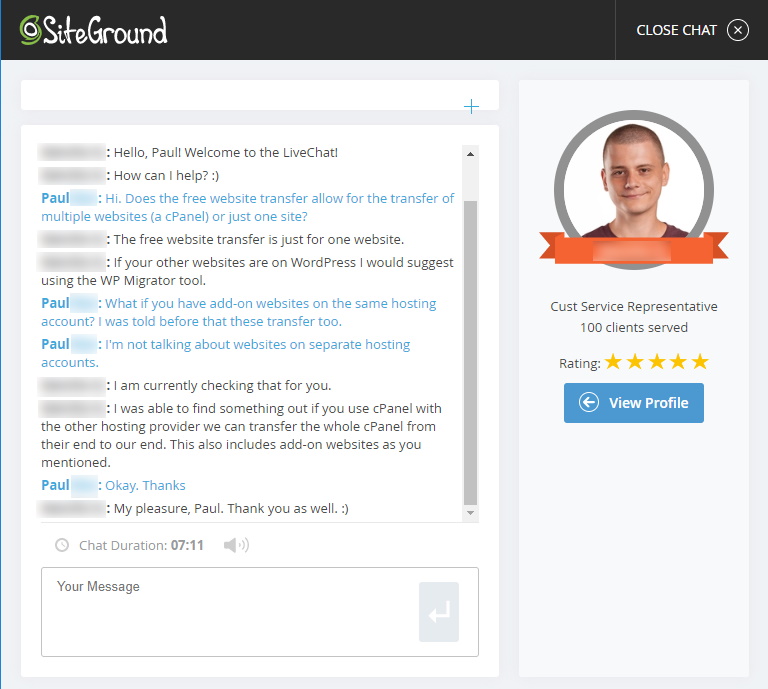
The agents are knowledgeable, professional and friendly. And their technical specialists are extremely skilled.
I’ve never reached out to support and not gotten my issue resolved. I talk more about SiteGround’s support in my review here.
WP Engine Support
WP Engine also has a very fleshed out support system. You can:
- access the Help Center, where you can get information, tutorials, tips, and more. Sections include setting up your site, account features, and troubleshooting.
- send an email message.
- live chat and talk on the phone with sales support.
- get specialized support 24/7/365 from within your account.
WP Engine has office locations in the USA, UK and Australia, and you can contact each one separately. You can hop on a live chat with a sales rep from any page on the site by clicking the overlay in the bottom-right corner.
I have contacted support many times, and I have always been able to connect with an agent very quickly. The agents are friendly and helpful, but when it comes to sales support, they often skirt around your questions, which is a bit annoying.
Note that you can only get 24/7 phone support from the Growth Plan up. 24/7 ticket support is available with Enterprise plans.
Winner: Tie
Website Transfer
SiteGround
SiteGround offers a free professional website transfer on their GrowBig and GoGeek plans. For the StartUp plan and for additional transfers, the fee is $30.
I don’t believe there are limits on how many email accounts and websites you can transfer.
You can transfer one website or an entire cPanel that consists of multiple websites. It’s easy to request a transfer from within your hosting account.
WP Engine
It doesn’t appear that WP Engine offers professional website transfer services. However, they have something that is arguably better: an exclusive WordPress migration plugin.
This migration plugin is available to all who have a WP Engine hosting account. All you need to do is install the plugin on your old site and follow a straightforward process to complete the migration.
Alternatively, you can migrate your WordPress site manually by backing up the database(s) and files. WP Engine has documentation on how to do this.
Winner: Tie. SiteGround offers free professional transfers, but WP Engine’s migration plugin is great.
Security
Security features that protect against hacking, bots, and other attacks are extremely important. Let’s explore the security features of both web hosts:
SiteGround
SiteGround takes server security seriously. For starters, they have SFTP and SSH access and offer a free SSL certificate for websites. In addition, they do the following:
- set all servers to PHP 7 with the latest updates and fixes.
- run Apache in a chrooted environment with suExec.
- block malicious attackers and bots with complex IDS/IPS systems.
- protect customers from the most common attacks with ModSecurity.
Their SG Site Scanner tool is powered by Sucuri and can be used to scan for malware on a daily basis. This service costs just over $1 per month. For more information on the SG Site Scanner, go here.
WP Engine
WP Engine offers plenty of documentation on the security measures they take to protect the WordPress websites they host.
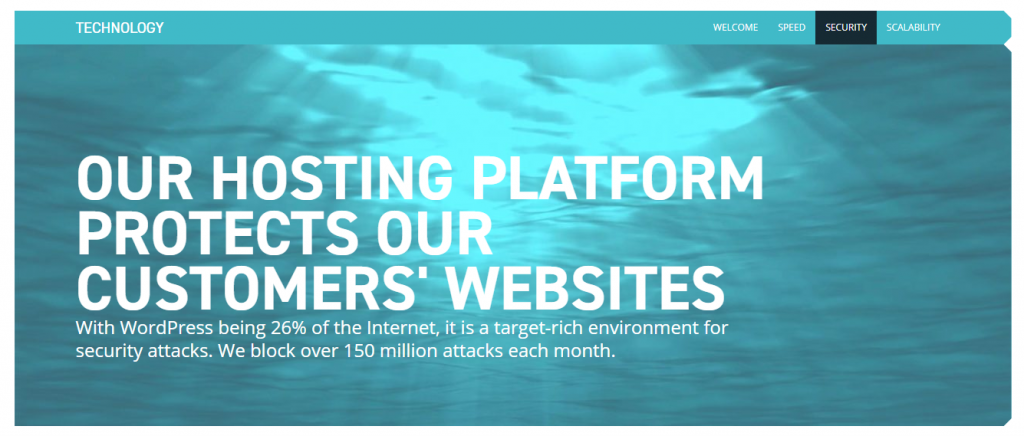
They block over 150 million web application attacks each month, and they:
- detect and block threats. They dynamically inspect traffic looking for suspicious patterns and other indicators.
- do proactive security maintenance. WP Engine engineers may create a one-off plugin or proactively update a plugin before official updates are released.
- proactively block various web application attacks at the NGINX layer and within WordPress.
- monitor plugin vulnerabilities and take action to protect customer sites.
- quickly upgrade customer sites after WordPress comes out with a security update to prevent attacks.
They also have disk write protection and disk write limitations. Keep in mind that WP Engine disables certain plugins for security reasons.
Winner: Tie
Prices
Price is an important consideration for many people looking to get web hosting. In general, it’s best to pay a little bit more for better performance and reliability, but there’s a limit to this.
WP Engine is much more expensive than SiteGround on their shared WordPress plans.
See the table below for a comparison of SiteGround and WP Engine pricing on shared plans. Note that these prices are correct only at the time of writing and are subject to change.
| Shared Plans | Entry-Level | Mid-Level | Upper-Level |
| SiteGround – Discounted | $3.95/mo | $5.95/mo | $11.95/mo |
| SiteGround – Normal | $11.95/mo | $19.95/mo | $34.95/mo |
| WP Engine | $29.17/mo | $95.83/mo | $241.67/mo |
These rates are based on annual billing. WP Engine also offers monthly rates that are more expensive.
It’s worth noting that WP Engine includes many added services for free (like the migration tool), which helps justify the cost, but they’re still very expensive when you consider the fact that SiteGround offers a comparable service for WordPress.
For a list of features that come with each plan, you can see the pricing pages of each web host (SiteGround prices and WP Engine prices) or the previous sections of this comparison.
Winner: SiteGround
The Verdict
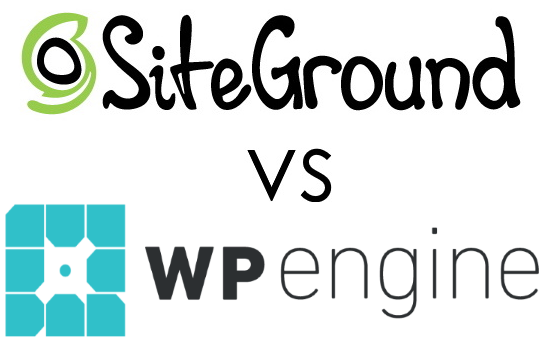
SiteGround and WP Engine are both quality web hosts that perform highly in important metrics. They use the top technologies, have excellent speed and uptime, and have great support.
The main difference is that WP Engine specializes in managed WordPress hosting and their plans are much more expensive.
Are their costs justified? It’s hard to say, but I’m leaning towards no. SiteGround offers similar managed WordPress hosting capabilities at a much lower cost.
WP Engine has a leg up on SiteGround in a couple respects: they have been shown to have consistently higher speeds (even though both are very good), and their WordPress solutions have a few more features and functionality.
I recommend SiteGround if:
- you don’t need managed WordPress hosting.
- you want top speed and practically 100% uptime at an affordable cost.
- you want a free professional site transfer to a shared hosting plan.
- you want hosting that uses the most cutting-edge technologies.
- you don’t need the specialized solutions that a more expensive web host offers.
Use WP Engine if:
- you need the most functionality in a managed WordPress hosting solution.
- you don’t mind paying $75+ more per month.
- you want slightly better website speed.
All in all, I definitely recommend SiteGround — I’ve been using them for years and I’m more than pleased.
For the typical blog or website owner that is creating content for their WordPress website, I would say there’s no reason to go with WP Engine. But if you’re a developer or have advanced WordPress needs, they can be a really good option.
Thanks for reading this comparison. This comparison contains affiliate links for SiteGround that I may receive a commission from. Note that the views expressed here are my own and are not official statements from the web host.
Have you used SiteGround or WP Engine? Do you have any questions? Feel free to share your thoughts in the comments.

